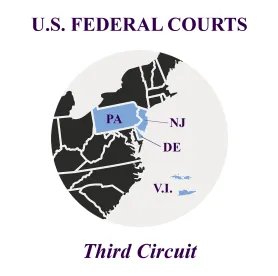The Third Circuit recently affirmed the significant discretion that district court judges have to manage their dockets when it confirmed that “good cause” must be shown under Federal Rule Civ. P. 16(b)(4) to add a party or amend a pleading after the deadline in a district court’s scheduling order has passed rather than Rule 15(a)’s more liberal (“[t]he court should freely give leave when justice so requires”) standard. In Premier Comp Solutions, LLC v. UPMC, 970 F.3d 316 (3d Cir. 2020), the plaintiff made a motion to amend its complaint and add a party, relying on Rule 15 of the Federal Rules of Civil Procedure. The district court denied the motion, reasoning that because the deadline in the court’s scheduling order had passed, Rule 16(b)(4) required the plaintiff to show good cause.
In the underlying case, the plaintiff filed suit alleging violations of federal antitrust and state unfair competition laws. Nearly five months after the deadline in the district court’s scheduling order for amending pleadings or adding new parties, the plaintiff deposed an employee of the defendant who testified regarding an illegal bid-rigging agreement between the defendant and a third party. Plaintiff then moved to file a second amended complaint asserting a new antitrust count and adding the third party as a defendant. In the motion, the plaintiff asked the district court to apply Rule 15(a) of the Federal Rules of Civil Procedure and did not mention Rule 16(b)(4).
The defendant countered that the plaintiff’s motion relied on the wrong rule and plaintiff had failed to show diligence, which is relevant to a court’s determination of “good cause” under Rule 16(b)(4). In reply, defendant conceded that Rule 16(b)(4) applied and argued for the first time that it had been diligent.
The district court denied defendant’s motion, noting that it had failed “to even discuss due diligence, relying instead on Rule 15(a).” Thus, the district court concluded, defendant had “utterly fail[ed] to establish good cause” under Rule 16(b)(4).
On appeal, Judge Hardiman writing for the Court, first noted that “we take this opportunity to clarify that when a party moves to amend or add a party after the deadline in a district court’s scheduling order has passed, the ‘good cause’ standard of Rule 16(b)(4) applies. A party must meet this standard before the district court considers whether the party also meets Rule 15(a)’s more liberal standard.”
The Third Circuit went on to reject plaintiff’s two arguments on appeal: (1) that Rule 16(b)(4)’s “good cause” standard does not require a party to show diligence and (2) if such a showing is require, its reply brief sufficed. It found that because plaintiff failed to present the first argument to the district court it forfeited it on appeal. Likewise, the Third Circuit concluded that the district court did not abuse its discretion when it found plaintiff forfeited the second argument by only raising it on its reply brief.
There are a couple of important takeaways from this succinct but significant decision for anyone litigating in the Third Circuit. First, be mindful of scheduling orders and deadlines for adding parties or amending pleadings. To the extent possible, litigants need to expeditiously conduct discovery as early as possible so as that if they discover a basis for adding new claims or a new party it won’t be potentially time barred from doing so. To the extent that the deadline for amending a pleading or adding additional parties has passed, litigants must be prepared to show “due diligence” and “good cause” in support of the motion to amend. Litigants should also be able to explain to the court why they were unable to discover the facts supporting their new claims or adding a new party sooner. Finally, while not a new principle, this is a good reminder not to raise arguments for the first time on reply briefs.



 />i
/>i

